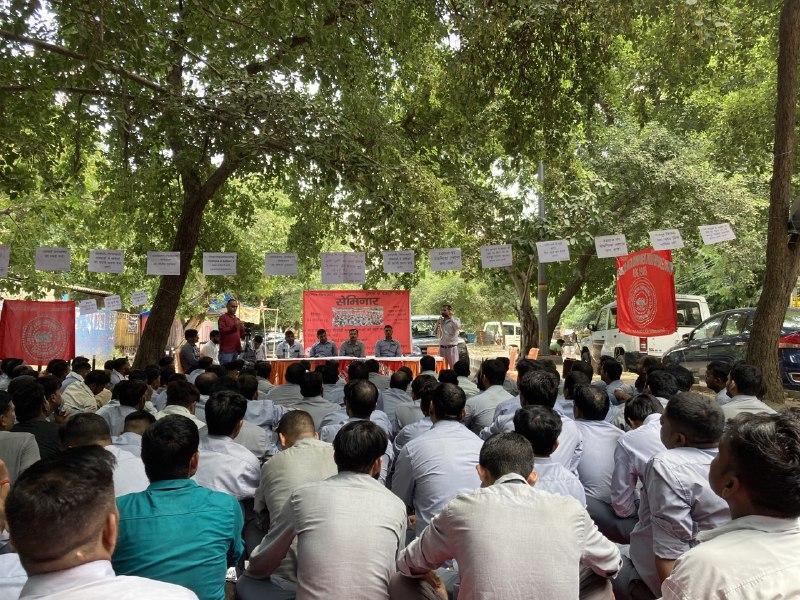Gurugram: Industrial Workers Term Labour Codes as ‘Black Laws’, Reject PM’s Assertions

The seminar was organised at Gurugram's Mini Secretariat on Sunday. Image clicked by Ronak Chhabra
Gurugram: “Repeal the black laws” – a phrase that was used by agitating farmers till last year until the three contentious farm laws were eventually withdrawn after a 15-month-long protest, was frequently raised as a demand during an open seminar held on Sunday by an industrial workers’ union – this time the demand is for withdrawal of the four labour codes. The workers believe that the labour codes are also designed to benefit corporates.
The seminar was organised at Gurugram’s Mini Secretariat by the employees union of Manesar-situated Bellsonica Auto Components India Private Limited, a first-tier vendor of auto major Maruti, which saw the participation of leaders of other auto unions of the industrial belt.
The union leaders termed the labour codes as “black laws”, as they feared these are aimed at diluting hard-won workers’ rights, and could trigger unrest across industries.
Several auto union leaders said that emboldened by the passage of the four codes, factory owners in the region had already started taking a “harsher stand” on numerous unions’ demands.
Passed in 2020, the three Codes – Industrial Relations Code; Code on Social Security; and, Occupational Safety, Health and Working Conditions Code – along with Code on Wages, which was passed in 2019, are collectively touted as “reforms” within the country’s labour market.
Their implementation, however, has been deferred multiple times over recent years.
NewsClick recently reported that there are indications that the Central government is now setting the stage, with the latest round of consultations with multiple stakeholders, for staggered implementation of the codes – with an initial rollout of two among these.
In this backdrop, in the two-day National Labour Conference comprising all States and Union Territories, held earlier last month in Andhra Pradesh’s Tirupati, Prime Minister Narendra Modi pitched the four codes as “simplifying” the labour laws – there are 29 such Central enactments that have been subsumed by the codes.
The codes, “will ensure the empowerment of workers via minimum wages, job, social and health security,” PM Modi was quoted by The Hindu Business Line as saying in his address to the conference.
Workers Flay Changes Under Codes
The discussion of leaders of industrial workers’ unions in Haryana’s major auto hub, however, said the changes brought in through codes were “anti-worker”.
“The Labour Codes will ‘legalise’ those practices of the management which are ‘illegal under the current labour laws’ and thus are challenged from time to time by the unions,” said Ajit Singh, general secretary of Bellsonica employees’ union on Sunday.
“Definitions of workmen have been changed to exclude apprentices; thresholds have been erected, and more so, increased in many cases to exempt employers from the ambit of regulations; trade union rights have been restricted; and, strikes have been made difficult under the new Codes,” Singh said while addressing the workers, highlighting the “anti-worker” changes enshrined in Industrial Relations Code.
Mohinder Kapoor, president of the Bellsonica employees union, stressed that the new Codes also compromise the safety of the workers. Under the Factories Act, 1948, every hazardous factory must constitute a Bi-partite Safety Committee (SC).
“But, not anymore, under the new Codes,” said Kapoor y.
The Occupational Safety, Health and Working Conditions Code leaves the matter to the discretion of the government which “may by a special or a general order” require the hazardous establishments to constitute the said SC. It also prescribes thresholds for safety officers for non-hazardous ones.
Flaying these changes, Ajay Yadav of the Maruti workers’ union of the Gurugram plant asked, during his address, whether industrial workers feel safe working within industrial establishments in future. “Already, we are seeing an increase in mishaps in factories across the country due to which hundreds of workers are losing their life. In such a situation, will the children of workers be safe – that is the question which we must ask the government,” he said.
The considerations of businesses remained “dominated” during the framing of the four Labour Codes according to Anil Panwar, district general secretary, AITUC-Manesar, adding that what this means is that, whatever the government says, the job security of the workers will come under attack.
Concern Over ‘Labour Disputes’ in Auto Hub
Expressing “deep concern over the increasing labour disputes” with management in the industrial sector, a joint council of all trade unions of Gurugram and Rewari last month highlighted cases of 11 factories in the auto region, where workers are being “denied justice.”
“These labour disputes have been going on for a long time, but it is a matter of great regret that due to not taking proper legal action by the higher officials of the Labour Department, the workers are being made to run from pillar to post, and are being denied justice,” the council said, in its memorandum dated August 3, which is addressed to Gurugram’s Deputy Commissioner and was accessed by NewsClick.
Some of the factories, as mentioned in the memorandum, where labour demands are pending for many years now, include Napino Auto and Electronics Limited, Munjal Showa Limited and Bellsonica Auto Components India Private Limited, among others. The council also demanded the repeal of the codes, which will allegedly allow “increasing” the daily work hours from the current 8 to 12.
Meanwhile, in a bid to form a joint ‘mazdoor-kisan’ front to fight “anti-worker” measures, the Bellsonica employees union made an appeal to the Samyukt Kisan Morcha (SKM) last month, asking the farmers’ body to come out in support of the industrial workers’ union by holding a joint public meeting in Manesar.
Asked about it, Singh of Bellsonica employees union told NewsClick that both the bodies were expected to hold a meeting to discuss the same on September 6. SKM is an umbrella body of farmer unions from across the country that had spearheaded the year-long national movement against the three farm legislations.
Get the latest reports & analysis with people's perspective on Protests, movements & deep analytical videos, discussions of the current affairs in your Telegram app. Subscribe to NewsClick's Telegram channel & get Real-Time updates on stories, as they get published on our website.























